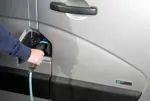Low fuel costs and a growing economy have resulted in a 2% increase in vehicles on Britain’s roads prompting fears of potential gridlock.
The provisional figures from the Department for Transport (DfT) show Britons are using more cars, vans and lorries than ever before.
Van traffic continued to rise faster than any other vehicle type, increasing by 6.0% to a new peak of 46.9 billion vehicle miles, while the the provisional figure of 316.1 billion vehicle miles is the highest rolling annual total ever.
The report suggests that this rise is partly due to the growth in the economy as well as lower fuel prices. Traffic on motorways and rural roads was higher than it has ever been.
The figures should “give cause for alarm”, says Gary Rae, campaigns director for road safety charity, Brake.
He said: “These rises are not sustainable. We’re in our 20th year and in that time, we’ve seen an increase of 19% in all traffic.
“In a report published earlier this year, the Department for Transport forecasts is for traffic growth of 19% to 55% between 2010 and 2040. Back in 2011, the RAC Foundation reported that the number of cars was set to increase by 43% by 2035 and traffic delays by 50%.”
“The figures are heading the wrong way and we’re heading for gridlock. The government needs to get a grip and outline what it intends to do.”
The RAC has long argued that the price of fuel is inextricably linked to the economy and suggests that the DfT figures are further proof of that and is something the Government should take heed of.
Pete Williams, head of external affairs Pete Williams at the RAC, said: “What we need now is a firm commitment from the chancellor in the Autumn Statement that he will not raise fuel duty from the already-excessive 58p a litre and add to the motoring tax burden.
“Britain’s motorists already pay in excessive of £40 billion a year in fuel duty, VAT on fuel, insurance tax and vehicle excise duty so are more than helping in plugging the deficit.
“Any increase in fuel duty would have to be seen as an opportunistic step for the Government to cash in on low oil prices which are predicted to stay that way for some time to come.”
Government statistics also show that commuters are continuing to suffer. Since early 2012, motorists in all regions have been experiencing a slower and slower start to their working days, with average morning speeds on A-roads falling.
Williams said: “Our roads are getting busier, meaning the network each morning is under real strain in certain locations.
“Many improvement schemes are already underway and further investment is just around the corner, but it will certainly be a case of congestion having to get worse before it gets better.
“Weary motorists are likely to feel more ‘rushtration’ on their morning commute for a fair while yet.
“It is absolutely critical that the investment into A-roads and the wider Strategic Network is protected and for the Government to push ahead with identifying key pinch points for a second road investment strategy.
“Motorists will be unforgiving should they not start to see genuine improvements in journey times over the next five years given the eye-watering sums they pay in taxation.”



















Simon - 13/11/2015 14:36
A good starting point would be working out how we can stop absolutely everyone needing to use the roads between 8-9 am and 5-6pm. Flexible working hours and encouraging businesses to invest in technology that allows more home working could solve this problem over night without spending millions on new roads or increasing taxes on fuel. What we need is smarter thinking not increased capacity.